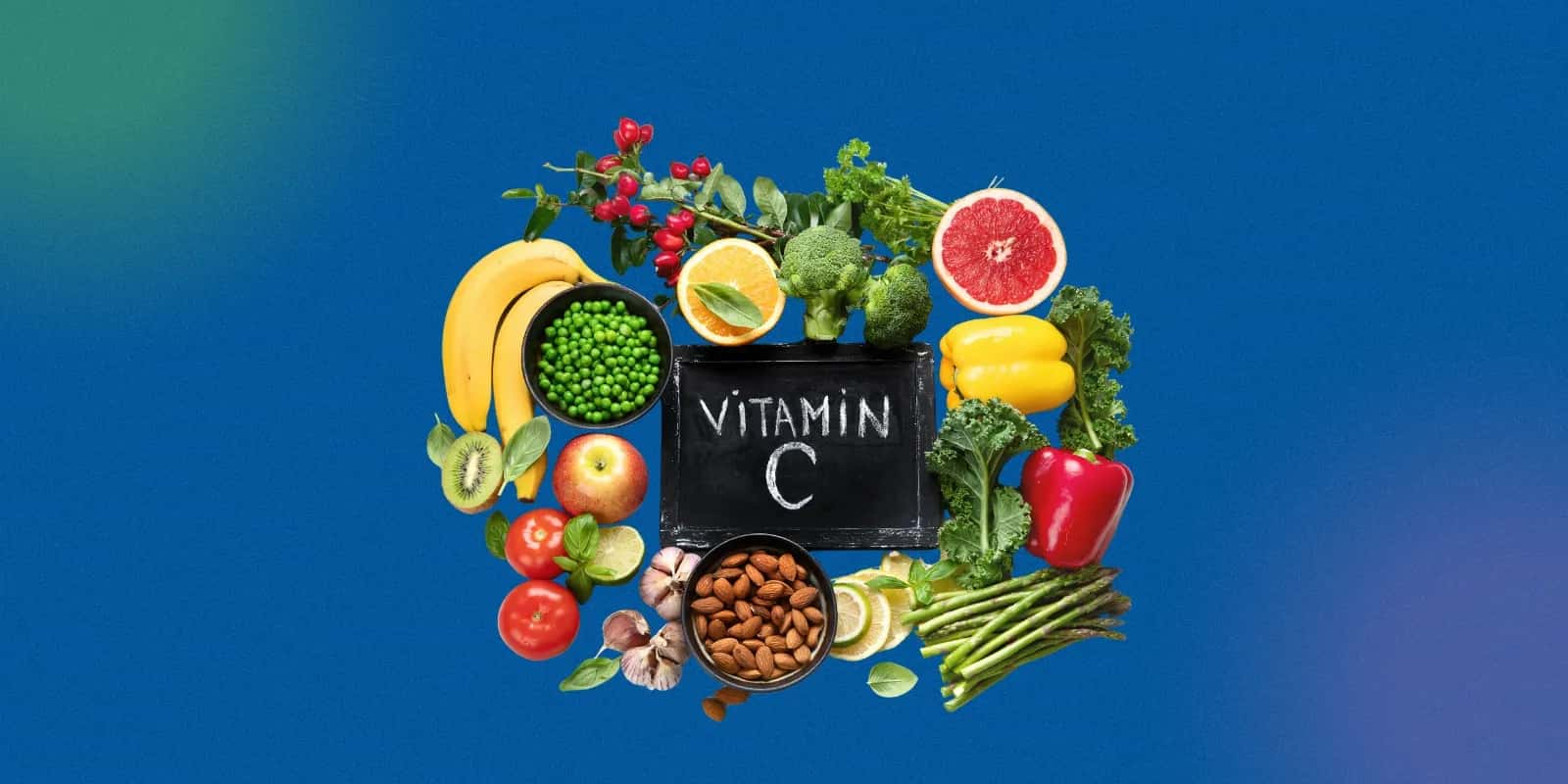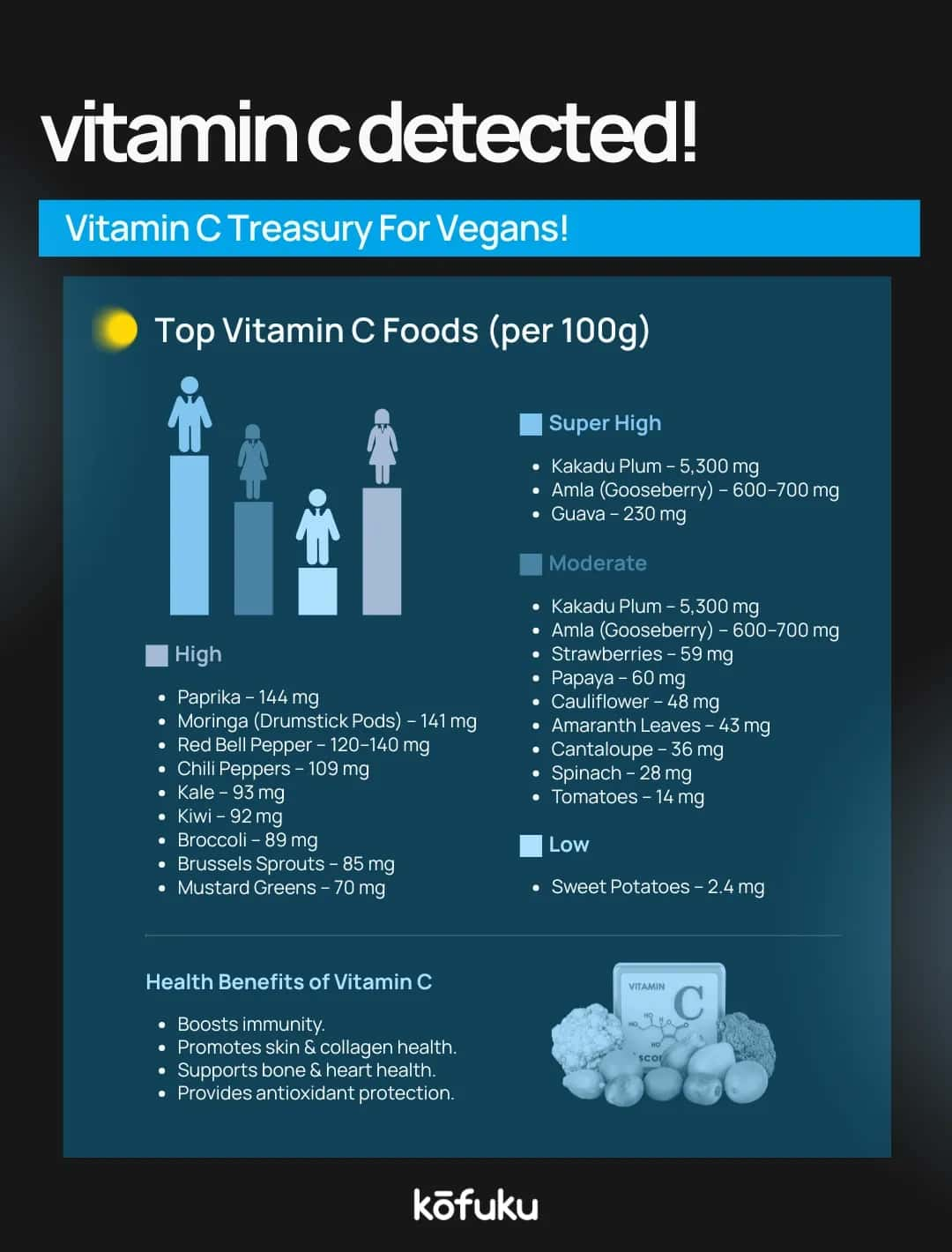10 Best Plant-Based Foods High in Vitamin C for Vegetarians and Vegans

Introduction
Remember your mum running behind you with a bowl of cut oranges or a glass of freshly squeezed lemon water every time you sneezed? In many Indian homes, vitamin C-rich foods have long been the first line of defence against seasonal flu, fatigue, and even dull skin and acidity. What’s the common thread, or rather, vitamin, among these? Vitamin C.
Vitamin C is an essential nutrient for your overall health. From helping boost your immunity to enhancing nutrient absorption, there’s a lot that vitamin C helps with. It is a water-soluble vitamin that’s found in many foods, particularly fruits and vegetables.
Today, with more people embracing plant-based diets, understanding the best sources of vitamin C for vegetarians and vegans is more important than ever.
In this blog, you will understand the importance of vitamin C and why you need it, the benefits of vitamin C for vegetarians, sources of vitamin C for vegans and much more.
What is Vitamin C and Why do You Need It?
Vitamin C, also known as ascorbic acid, is a water-soluble vitamin and is not stored in the body. This means we have to consume adequate amounts of vitamin C from vegetables and fruits each day. Ensuring you have enough vitamin C is crucial because it helps improve and maintain your overall health.
In fact, you might have seen face serums, creams, and cleansers with vitamin C, but have you ever wondered why vitamin C? Because its benefits are abundant, and some of them are:
-
Strengthens the immune system
-
Promotes healthy skin
-
Speeds up the healing process
-
Enhances iron absorption in the body
-
Acts as a natural detoxifier for the body
Benefits of Vitamin C for Vegetarians and Vegans
People nowadays are turning towards vegetarian and plant-based diets, and vitamin C for vegans and vegetarians is especially noteworthy. Many plant-based iron sources are less bioavailable, but vitamin C enhances the absorption of iron in the body. Additionally, vitamin C for vegetarians and vegans supports skin repair and reduces inflammation, an added benefit.
The majority of people rely on vitamin C for skin whitening, acne-free and spotless skin. This is also why many cosmetic products have vitamin C. It helps in reducing melanin production, giving the skin a brighter tone. The other benefits help keep the skin clear and minimise inflammation.
Top 20 Vegetarian and Vegan Foods Rich in Vitamin C
There are multiple sources of vitamin C for vegetarians and vegans. Here are some of them.
1. Citrus Fruits (Oranges, Lemons, Limes)
Citrus fruits cannot be left out of any list. Orange plants offer fruits that are iconic sources of vitamin C. A single cup of orange juice may give as much as 70 mg of vitamin C.
Lemons and limes provide not only zest to food preparation but also 30 mg of vitamin C per fruit. They are abundant in vitamin C and well-suited for daily consumption.
2. Guava – A Vitamin C Powerhouse
Did you know that Guava has four times the amount of vitamin C as an orange? It is at the top of the chart with more than 200 mg per 100 grams.
And because the glycaemic index of guava is low, it is also suitable for those who need to control their blood sugar levels. You can consume Guava as a juice, as a snack, or as an extra dressing in a salad.

3. Bell Peppers – Crunchy and Loaded
Red and yellow bell peppers contain 80–150 mg of vitamin C per 100 grams. Whether eaten raw, roasted, or stir-fried, they retain their vitamin C content reasonably well. While they serve as a great source of vitamin C for vegetarians and vegans, they are also a rich source of beta-carotene and antioxidants.
4. Broccoli and Leafy Greens
Broccoli contains approximately 89mg of vitamin C per 100g. Add this with kale, spinach and cabbage, all of which are superior sources of vitamin C for vegans and vegetarians. Light steaming preserves their nutrients while reducing anti-nutrients that may interfere with their absorption.
5. Berries (Strawberries, Blackcurrants)
Strawberries provide around 59mg vitamin C per 100g. Blackcurrants, however, shine with nearly 180 mg. Berries are not only good for immunity but also for collagen production and heart health.
6. Kiwi and Papaya – Tropical Vitamin C Boosters
Kiwi fruit contains 92mg per 100g of various vitamins and minerals, while papaya offers 60mg of vitamin C. They are also delicious, full of enzymes and great for the digestive system. Also, papaya has papai, which aids digestion, great news for the veggie lovers.
7. Tomatoes and Tomato Juice
Tomatoes are consumed widely, although they are low in content (20 mg/100 g). Fresh or juiced, they are an excellent aspect of salads and sauces. Even more nutritious in their content are sun-dried tomatoes and tomato puree.
8. Indian Gooseberry (Amla)
It is an old superfood that contains up to 600 mg of vitamin C/ 100 g. It is anti-inflammatory, supports the digestive system, and is frequently incorporated into Ayurvedic practice. Whether you consume it raw or juiced, Amla promotes a healthy immune system.
9. Terminalia Plant – Ancient Yet Potent
The Terminalia plant, which includes species like Terminalia chebula (Haritaki) and Terminalia bellerica (Baheda), is revered in Ayurveda. While not a direct vitamin C source, when used with amla (as in Triphala), it enhances the digestion and assimilation of vitamin C from other sources. It also supports detoxification and gut health, making it valuable in plant-based routines.
10. Fortified Foods – A Bonus for Vegans
Fortified plant-based milks, cereals, and beverages are reliable options. Look for products that mention “fortified with vitamin C and zinc” on the label. While not natural, these are helpful sources of vitamin C for vegans needing consistent levels of ascorbic acid.
Do You Need 1000mg of Vitamin C Daily?
The Recommended Dietary Allowance (RDA) value of vitamin C is approximately 75 to 90 mg per day in the adult population. Nevertheless, many individuals resort to 1000mg vitamin C pills or vitamin C 1000mg tablets when they need immune boosting, whether in times of illness or when under stress.
However, you should not consume a large amount of vitamin C unless advised by your doctor. Consuming excessive amounts of vitamin C can lead to side effects like diarrhoea, cramps, and kidney stones in some cases.

Vitamin C 1000mg Tablets vs Food Sources
1000mg vitamin C tablets can give a therapeutic effect, but may not be necessary. Excess vitamin C is eliminated through urine. The natural sources of vitamin C (food) are absorbed more effectively and are less likely to cause gastric problems.
Not all kinds of supplements are well advised, especially high doses, especially in the case of smokers, athletes or those recovering. It is best to consult with your doctor to determine which source of vitamin C is ideal for your body.
Role of Zinc in Immunity: Why Vitamin C and Zinc Tablets Work Together
Vitamin C and zinc tablets combine two powerful immunity boosters. Zinc helps immune cells function optimally, while vitamin C enhances white blood cell activity.
For vegetarians and vegans, vitamin C and zinc tablets can help bridge dietary gaps, notably when zinc-rich animal products are excluded.
Can Vitamin C Help in Skin Whitening?
Vitamin C also inhibits the melanin-producing enzyme tyrosinase, making vitamin C foods for skin whitening a popular option. Regular consumption can assist in decreasing pigmentation and enhancing uniform, lighter skin.
It does not, however, work with a guarantee, nor can it be mistaken for a fad of fairness. Vitamin C is only promotes healthy and glowing skin and does not make your skin tone lighter.
Common Signs of Vitamin C Deficiency in Plant-Based Diets
Nutrient deficiency is common, especially for those on vegetarian or vegan diets. Recognising the signs and making the appropriate changes in your diet is crucial to avoid any adverse effects. Here are some common signs of vitamin C deficiency:
-
Frequent colds or infections
-
Fatigue and irritability
-
Bleeding gums
-
Slow wound healing
-
Rough, bumpy skin
These could indicate inadequate vitamin C intake. If you suspect a vitamin deficiency, consult a healthcare provider; they will guide you on how to meet your nutrient requirements safely.
Tips to Maximise Vitamin C Absorption from Plant-Based Sources
-
Eat raw: Whenever possible, consume fruits and vegetables raw or lightly cooked. However, be sure to wash them thoroughly to eliminate dirt, residual pesticides, and other contaminants.
-
Pair with iron-rich foods: Vitamin C enhances iron absorption. Pair amla or oranges with spinach or lentils.
-
Avoid overcooking: Vitamin C is a water-soluble and heat-sensitive nutrient; if you cook the food for too long, it will lose its nutritional value.
-
Minimise storage time: Fresh produce contains the highest levels of vitamin C. Store it minimally and consume it soon after cutting.
-
Include healthy fats: While not directly related, healthy fats play a role in overall nutrient absorption. Eat nuts, seeds, or avocados.
Final Thoughts: Choose Natural Before Supplements
When daily targets are set and there is insufficient time to consume adequate sources of vitamin C, people often resort to vitamin C 1000mg tablets or supplements. Although they are helpful, nothing can substitute for natural and food-based nutrition.
Fruits such as guava, amla and citrus, as well as leafy vegetables and bell peppers, provide not just vitamin C, but also fibre, enzymes and other vital phytonutrients.
If you're a vegetarian or vegan aiming to boost your immunity, brighten your skin, or support your energy levels, these plant-based foods high in vitamin C are your go-to allies. Supplements like vitamin C and zinc tablets can be a backup, not a frontline defence.
Remember, nature knows best. Trust the orange, not just the 1000 mg vitamin C pills.

Q. What are the best vegetarian sources of vitamin C?
A. Guava, amla, oranges, bell peppers, kiwi, and broccoli are excellent vegetarian sources of vitamin C. These foods offer additional antioxidants, fibre, and nutrients, making them ideal for daily immune and skin health.
Q. Can I take 1000mg of vitamin C daily as a vegan?
A. Yes, vegans can take 1000mg vitamin C tablets safely, but it's best to consult a doctor. High doses may cause digestive issues, so prioritise natural sources unless supplements are medically advised.
Q. Do vitamin C and zinc tablets really work for immunity?
A. Vitamin C and zinc tablets support immune function by enhancing white blood cell activity and reducing inflammation. They are effective when taken during deficiency or illness, but shouldn't replace a balanced diet.
Q. Is there a link between vitamin C and skin whitening?
A. Vitamin C helps reduce melanin production, resulting in brighter, more evenly toned skin. While not a bleaching agent, it supports skin clarity and radiance by promoting collagen synthesis and providing antioxidant protection.
Q. Which is better: vitamin C foods or supplements for vegetarians?
A. Natural vitamin C-rich foods are beneficial for vegetarians, as they provide additional nutrients and are easier on the stomach. Supplements are helpful for the short term but shouldn’t replace a varied and balanced plant-based diet.

Vitamin D3 Deficiency: Symptoms and Vegetarian Foods Rich in Vitamin D

Erectile Dysfunction and Vitamin D: Understanding the Link

Vitamin B12 Guide: Rich Food Sources, Deficiency Symptoms, and Hair & Weight Benefits

Liver Transplant Donors: What You Need to Know

Are Sunflower Seeds Good for You? Nutrition, Benefits, and Planting Guide


